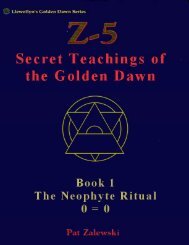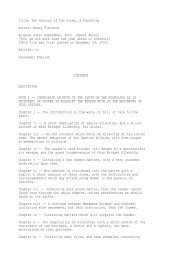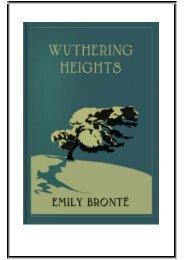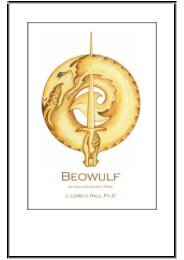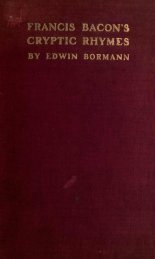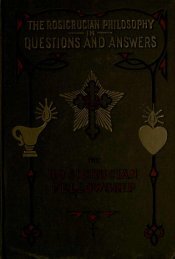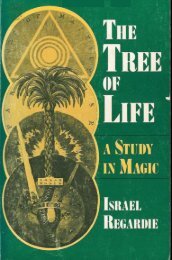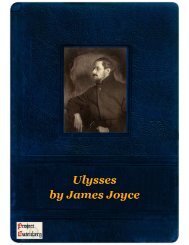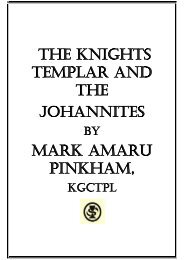Click to download PDF version: 3.87MB - Global Grey
Click to download PDF version: 3.87MB - Global Grey
Click to download PDF version: 3.87MB - Global Grey
Create successful ePaper yourself
Turn your PDF publications into a flip-book with our unique Google optimized e-Paper software.
10 At the Back of the Black Man's Mind By R. E. Dennett<br />
Maniluemba is humpbacked and short in stature, but he possesses a rather fine Jewish<br />
cast of face; and he is a bit of a dandy evidently, for the ends of his moustaches were<br />
strung through the hollow centres of two amber beads. In the middle of his forehead,<br />
from his hair <strong>to</strong> his nose, ran a line in red chalk, flanked on each side by a white one;<br />
while from his ears <strong>to</strong> his eyes similar marks nearly completed his fetish <strong>to</strong>ilet. On<br />
either car he had placed a white chalk mark, while a string with a charm attached <strong>to</strong> it<br />
was worn as a kind of necklace. He wore a waistcoat and an overcoat with a velvet<br />
collar, while a fancy cloth hung on his belt around his waist, and in front of this<br />
his nkanda ndéci (a skin). 4<br />
I placed my offerings before him and congratulated him upon his election, and (while<br />
his people chased fowls) we had a long and interesting talk, and I <strong>to</strong>ok his pho<strong>to</strong>graph.<br />
Then he gave me his pipe <strong>to</strong> smoke, and shook me by the hand, until his heavy marriage<br />
bracelet fairly rattled against his bony wrist; and as I was leaving he presented me with<br />
the result of his people's hunt, namely, three fowls, and bade me go in peace.<br />
Upon my return journey, after passing the <strong>to</strong>wn of Ximoko, I came <strong>to</strong> a place in the<br />
grassy plain marked by the sacred tree Nkumbi (Pl. II). Here the Maluango elect is<br />
received by the princes upon his first official entrance upon the sacred ground (Xibila)<br />
set apart as the residence of the Kings of Luango. 5<br />
The place where this tree rears its stately head in lonely glory is called Xibindu bindu<br />
Xibukulu lu mpilo. Xinkumba means a maiden, and the natives tell me the place, and the<br />
tree Nkumbi, takes its name from the fact of some royal maiden having arrived at<br />
womanhood there. Man and woman <strong>to</strong>gether may not cross this Xibindu (valley); the<br />
man must go first, and when he is well across the woman may follow him. At Boa Vista<br />
there is another such Xibindu, and should a man and a woman cross these places<br />
<strong>to</strong>gether, they will be punished by having no children. So much for the tree at the<br />
entrance of the sacred ground. As we leave it upon the road <strong>to</strong> Lubu (Maluango's burialplace)<br />
there stands a Nsexi tree, once a market tree, beneath whose scanty shade the<br />
corpse of the defunct Maluango is placed, awaiting the meeting of the people, whose<br />
duty it is <strong>to</strong> carry it <strong>to</strong> Lubu for burial. Here the little valley is called Xibindu bindu ku<br />
Ximonika na Buali, the valley of the last look at Buali (Maluango's <strong>to</strong>wn). As we neared<br />
Luango we were struck by the great beauty of a deep valley that runs from the foot of<br />
the steep cliff upon which we s<strong>to</strong>od, away <strong>to</strong> the sea. This valley is called Bulu Nzimbu<br />
Xikoko (the valley of the fly and the mosqui<strong>to</strong> hand in hand), and from out its<br />
makes <strong>to</strong> escape from the net when caught.("Lemba means, <strong>to</strong> cease. The rites of Lembe are those which refer<br />
<strong>to</strong> the marriage of - woman who swears <strong>to</strong> die with her husband, or rather <strong>to</strong> cease <strong>to</strong> live at the same time<br />
that he does."-Letter of the author's <strong>to</strong> Miss Kingsley, quoted in West African Studies, p. 193.)<br />
4<br />
There are two kinds of skins worn in this way by the Bavili: nkanda ndéci, a wild cat-skin, and xingola<br />
xinyundu, the otter-skin. Those who wear these skins are considered <strong>to</strong>-day very well <strong>to</strong> do people; there is<br />
one thing about them that they must always bear in mind, and that is, when they take them off not <strong>to</strong> pull<br />
them downwards, but <strong>to</strong> take care <strong>to</strong> pull them upwards between the belt and the cloth; otherwise they will<br />
have no children<br />
5<br />
Xi=ci, quality of, or earth; bila, <strong>to</strong> meet or <strong>to</strong> heap up. I could not find any lombi in Maluango's xibila, but the<br />
meaning of the word XIBILA is very suggestive, i.e., sacred grove<br />
www.globalgrey.co.uk



